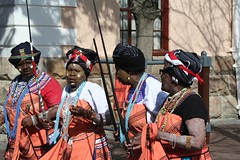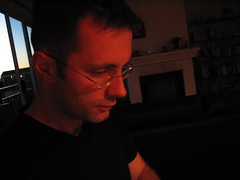From the moment our 747 landed at the O.R. Tambo international airport in Johannesburg I knew that we were about to begin a new adventure. Colors, smells, landscapes, sounds, people and life in general, all was different from the manifestations of the continent we had left just a few hours earlier. Do you remember that feeling that comes over you when you arrive in a place you have never seen before, even if it’s just a few hours away from home? Do you recall that avalanche of sensations of all kinds whose only common feature is that they are all different and unfamiliar? One tries to absorb and process all that input, and in a few days it all becomes just normal and loses intensity, but the first day is always unforgettable.
I have already written about our days in Pretoria and our visa troubles. It turned out in the end, that the troubles weren’t as big as I had thought they could be – except for Zimbabwe - which we will not be visiting - getting all the other visas was just a breeze. Or course, we had to pay for them, sometimes up to $75; it surely doesn’t come out cheap to visit those wildlife reserves if you’re a gringo! How do they call gringos in Africa?
South Africa is a beautiful but uneasy place to travel to. You cannot avoid asking yourself the troubled and complex social questions that come naturally with this place, like a permanent and ominous cloud. What has changed since apartheid has fallen? Can whites and blacks reconcile and build up a future together? How can a white man live in this country without an overwhelming sense of guilt for the crimes of the past? How can a new national identity be built? How can prosperity be brought to the overwhelmingly poor black majority? Can something be done about the AIDS crisis and why is the government sticking their head in the sand? And my favorite: is Johannesburg really that dangerous?
As a traveler with an open eye I couldn’t help noticing the peculiar details. The streets we walked or driven on, whether they were in the suburbs in Pretoria or in downtown Johannesburg or anywhere in or around Cape Town, all looked spotless; there was not an ounce of garbage in sight. Although the situation in the townships may be different, street cleanliness in and around cities is an indication of strong civic sense, which in turn is a solid foundation for nation building.
Race issues are big in South Africa and it should be so, until all things about skin color have been discussed over and over, until everything was understood, and the words have been turned around so many times that they have become meaningless. While apartheid has ended and the majority has finally gained freedom, there hasn’t been a redistribution of wealth to accompany it. I think there shouldn’t be one at all – any form of reparation for immaterial injustices like the deprivation of freedom should consist in programs to create jobs and infrastructure, and to improve education and health systems. Anything remotely punitive would lead to a disaster - just look at neighboring Zimbabwe and what the redistribution of land owned by white farmers has brought them…
The economic differences still prevail and match the previous social differences. You cannot help notice that the majority of shop or restaurant owners and managers are white and that most of the occupants of the vehicles you see on the street are white as well. At all the mid-range restaurants we have dined, most of the clientele were white – they may have been mostly tourists, I don’t know. There is certainly an emerging black middle class but it will take a while until things change noticeably. If anything, there are big hopes for the future and the whole country seems to be going through a construction frenzy – new shopping malls, houses and apartment buildings are growing out of the dirt every day…
Why is crime so wide-spread in South Africa? Nothing happened to us (yet - knock on wood!) but everybody tells us that things are really bad. While we were in Cape Town the newspapers were full of articles about the resurgence of muggings against hikers on Table Mountain. The answer is obvious, crushing poverty and the lack of education are pushing destitute young men from the townships to crime. But is anything done to stop this? If you listened to South Africans' opinions about their government, you’d think there isn’t. Indeed, they have their troubles and creating jobs and schools is not easy and doesn’t happen overnight. But as a tourist, you can’t help noticing the almost complete lack of police on the streets. I have hardly seen a uniformed man or a patrol vehicle since I arrived here. Just drive for a few minutes in any town in the United States and count the police cruisers you cross… South America had police officers everywhere, some of them heavily armed; South Africa seems to lag far behind in the “Law & Order” chapter.
How long will it take until things will have visibly improved? Many years, I think; there have been only 15 since apartheid's end. To compare, Romania’s anti-communist revolution has been 18 years ago and the old mentalities are still alive and well. I have faith in human nature, but it takes an awfully long time to change…
I started to write a post about the beauty of Cape Town and the southern wine country and look what I came up with...





1 comment:
Un petit coucou a vous 2 du MS ville ou rien n a change. Profitez bien. Bises. Sam&Greg
Post a Comment